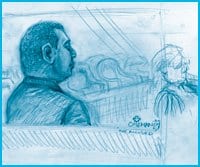Danny Rao threatened the one witness who maybe could have put him away. Justice Mary Humphries acquitted Rao of manslaughter Dec 10, in the biggest gaybashing case Vancouver has seen in years.
Police arrested Rao and three of his friends after they found Aaron Webster’s brutally beaten body near the gay cruising trails in Stanley Park three years ago.
Though the Crown’s star witnesses told the court that Rao was an active participant in the killing-chasing Webster to his car and striking him repeatedly with a weapon-the judge ruled their testimony couldn’t be trusted without corroboration. (The star witnesses in this case were two youth accomplices who agreed to testify against Rao and co-accused Ryan Cran in exchange for lighter sentences for themselves.)
The youths’ testimony was “so fraught with inconsistencies and self-serving untruths” that it would be “dangerous” to base a conviction on their evidence alone, Justice Humphries ruled Dec 10.
So she looked for corroborating evidence from other, independent witnesses to back the youths’ statements up. She found nothing conclusive on Rao.
The closest she came was Cole Bunke’s testimony about a conversation he had with his friend Rao after the attack.
Bunke told the court that he ran into Rao at the Royal Oak SkyTrain station a few months after Webster was killed. The killing came up in conversation, he said, and Rao “mentioned being there to me. But he never specifically mentioned that he had anything to do with it. He just mentioned being at Stanley Park and that they were there looking for peeping toms, beating up peeping toms, or whatever it was that they” Bunke trailed off.
The conversation wasn’t enough to convict Rao, the judge ruled. (Neither was another conversation he later had in front of witness Lance Rudek, where he cautioned Cran not to make “another trip like the last one we made downtown.”)
Bunke and Rudek’s evidence could be construed against Rao, the judge acknowledged-but then again it could simply show that Rao was in the park that night as a passive spectator (which is not illegal).
Bunke, in particular, “was quite vague in his account of the conversation, but said that Rao had never specifically mentioned that he had anything to do with it,” the judge noted-before giving Rao the benefit of the reasonable doubt and acquitting him.
That was Dec 10.
Bunke testified in November.
Rao threatened him in April.
According to provincial court records, the Crown charged Rao with obstructing justice for threatening and attempting to interfere with Bunke last spring. The incident took place while Rao was out on bail on his manslaughter charge. (Though Rao was initially denied bail after his arrest for manslaughter in Oct 2003, a judge later reconsidered and let him out on bail two months later.)
Judge Jane Godfrey convicted Rao on the obstruction charge on May 28, 2004. She sentenced him to the time he had already served while still in custody (the two months before he got bail). Another judge then revoked his bail, as well. Rao spent the rest of the summer and fall awaiting his manslaughter trial behind bars.
Only Bunke can say for sure if Rao’s threat had any impact on his testimony at trial, says Crown spokesperson Geoffrey Gaul. “Was he intimidated? Only he would be able to answer that.”
But, says Gaul, Bunke’s “evidence unfolded as anticipated” at trial. “The evidence presented in court was the evidence that the Crown anticipated coming from this witness.”
In other words, it seems Bunke did not back away from any earlier statements he made to the Crown. “We were satisfied that it was consistent,” Gaul says.
Still, the Crown can’t confirm that Rao’s interference had no impact at all.
When asked why the Crown assigned to the case didn’t mention the threat and didn’t ask Bunke what impact it had while he was on the stand, Gaul defends his colleague. Greg Weber chose not to mention it because the matter is under appeal, Gaul explains.
The BC Court of Appeal confirms that Rao appealed his obstruction conviction in July, but says he hasn’t filed anything since and is far from setting a date for a hearing.
Back in provincial court, records show that Rao’s conviction for obstructing justice was not his first conviction.
Rao was also charged with arson and breaking and entering into a Burnaby building in February 2003, before he was charged with manslaughter in the Webster case.
The arson charge stemmed from an incident at 5221 Neville St on Oct 3, 2002. A provincial court judge eventually found Rao guilty of a lesser charge of trespassing at night and sentenced him to three days in jail on Sep 10, 2004.
After his break-and-enter arrest, Rao was released on bail in March 2003 and given certain conditions to follow. Among the conditions attached: no contact with one of the youths who would later be charged with him in the Webster killing.
Further court records show that Rao was already under court order not to contact the youth at the time of the break and enter incident, though they don’t say why. The Crown charged Rao with failing to comply with that court condition, too, but later stayed the charge.
As for Rao’s recent manslaughter acquittal, Gaul says the Crown is still considering appealing. It has until Jan 10 to decide.
DEMONSTRATION.
Sun, Jan 23, 1 pm.
Courthouse Steps.
Corner of Nelson & Hornby Sts.

 Why you can trust Xtra
Why you can trust Xtra


